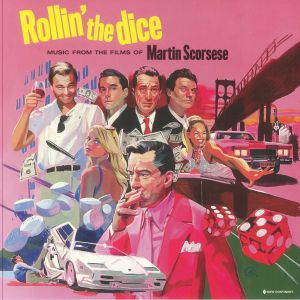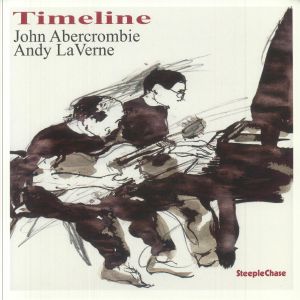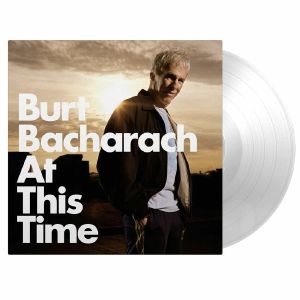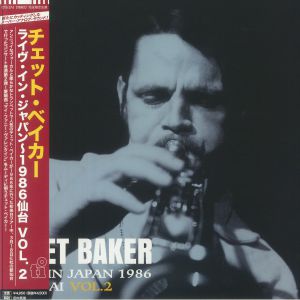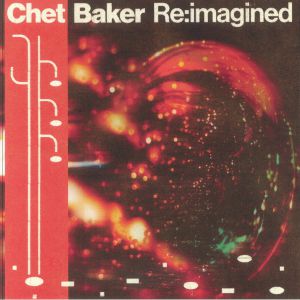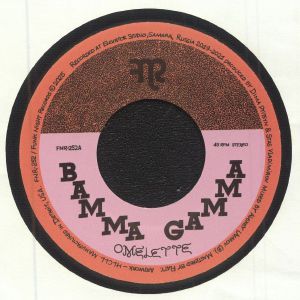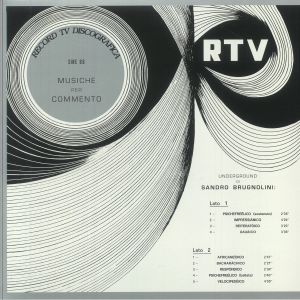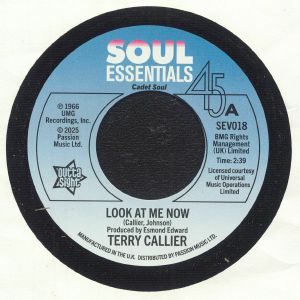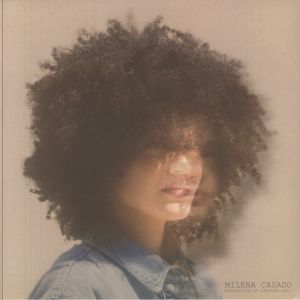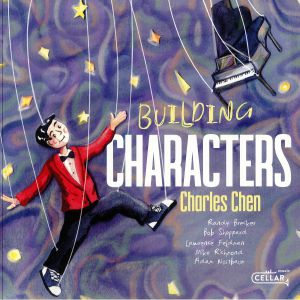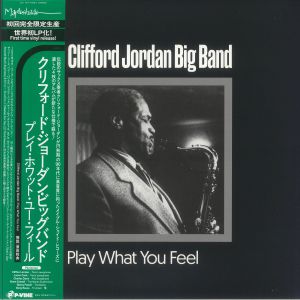Filter
Stock
Type
Label
Featured
Release Title
Price
Tags
New releases last four weeks: Jazz
Jazz vinyl released in the last four weeksReview: More than just a school concert, 1975's Rocking Grass was a sensation. On one fine estival day, The College Andre-Grasset auditorium overflowed, leaving hundreds spellbound. Registering its impact, Jean-Yves Quesnel and colleagues immortalised the show into a recording, transforming Rocking Grass into Phono Grass.Sessions at College Edouard-Montpetit's studio captured the energy of a shifting musical landscape in Quebec; and pianist Benoit Sarrazin, unknowingly recorded mid-performance, later became a professional musician. The album's original songs, 'Le Roi Muffe' and 'Bright Moments', embodied the era's creative freedom, with the latter later sampled by DJs and featured on Canadian Racer. Originally pressed on a 500-copy run, 1001 est Cremazie become a prized collectible; now it's much more readily available.
… Read more in stock ₺1.296,22
Rollin' The Dice: Music From The Films (limited 180 gram audiophile vinyl LP)
Cat: 843656 9195987. Rel: 22 May 25
in stock ₺681,33
Timeline (180 gram vinyl LP)
Cat: SPS 15381. Rel: 01 May 25
in stock ₺1.131,69
Polyhymnia (reissue) (limited numbered 180 gram orange vinyl 2xLP)
Cat: ALNLP 76W. Rel: 01 May 25
in stock ₺1.175,46
Finding My Way Home (reissue) (limited numbered baby blue vinyl LP)
Cat: ALNLP 74W. Rel: 01 May 25
in stock ₺1.065,77
La Saboteuse (reissue) (limited 180 gram yellow vinyl 2xLP)
Cat: ALNLP 75W. Rel: 01 May 25
in stock ₺1.175,46
A Paradise In The Hold (limited numbered gatefold ''pearl'' vinyl 2xLP + booklet)
Cat: ALNLP 77W. Rel: 01 May 25
in stock ₺1.252,45
North Sea Jazz Concert Series (limited 180 gram white vinyl LP)
Cat: 871862 7235744. Rel: 06 May 25
in stock ₺1.516,13
in stock ₺977,70
Harmony Of The Spheres (hand-numbered LP + booklet)
Cat: AOR 002ST. Rel: 07 May 25
Review: Born in Kent and central to the UK's 70s jazz modernism, Neil Ardley composed with the precision of a scientist and the vision of a cosmic philosopher. This long-overdue reissue from Analogue October captures a project that translates planetary orbits into a nine-note harmonic systemitoo vast for acoustic instruments, brought to life instead through early synthesisers. 'Arcturus' and 'Spiral Nebula' interlace fluid sax work from Barbara Thompson with John Martyn's signature reverb-drenched guitar, while Geoff Castle's synths evoke deep-space drift. 'Rainbow Four' channels modal funk, and 'Neptune' floats into ambient abstraction. Produced at Morgan Studios with a full ensemble of jazz heavyweightsiTony Coe, Ian Carr, Billy Kristian, Richard Burgess, and Trevor Tomkinsithis is a record that swings between science fiction and symphonic elegance. For all its high concept, it remains rooted in groove and human touch. A meticulous AAA cut from the Decca master tapes seals the experience: a bold and beautiful reminder of how far British jazz once dared to travel.
… Read more in stock ₺1.955,41
In Memory Of That Song (Record Store Day RSD 2025) (gatefold 180 gram white vinyl LP with obi-strip)
Cat: AESLP 002. Rel: 01 May 25
in stock ₺1.043,62
Everybody Loves The Sunshine (remastered) (translucent yellow vinyl 7" limited to 300 copies)
Cat: SSCRART 007 YELLOW. Rel: 09 May 25
Review: Roy Ayers at his most transcendent. 'Everybody Loves the Sunshine' is more than a summertime anthemiit's a spiritual moodboard that's shaped jazz-funk, soul, r&b and hip-hop for nearly 50 years. Ayers, born in Los Angeles and raised in its fertile fusion scene, places the vibraphone at the music's heart, coaxing heat-haze tones from sparse chords, synths, and that honeyed chorus. Flip it over and the instrumental version unlocks a deeper layer: stripped of vocals, it becomes a pure groove, drifting and hypnotic. What lingers is the balanceibetween melancholy and bliss, rhythm and release. A rare track that feels entirely unhurried yet quietly radical, now preserved in a limited pressing that looks as golden as it sounds.
… Read more in stock ₺702,95
Cat: SSCRART 007 BLACK. Rel: 09 May 25
Review: Few recordings capture the easy intensity of a summer afternoon like 'Everybody Loves the Sunshine'. Released in 1976 and wrapped in slow-drifting synths and soft falsettos, the track became a touchstone not just for Roy Ayers, but for 70s soul and beyond. Born in Los Angeles, Ayers helped define the jazz-funk crossover, placing the vibraphone at the centre of a sound both hazy and sharply detailed. The original vocal take on the A-side still melts under its own warmth; the instrumental on the flip uncovers the careful architecture beneath. Issued here on 7" black wax following Ayers' recent passing, this reissue feels like both a keepsake and a quiet honouring of an artist who shaped a whole way of listening.
… Read more in stock ₺702,95
Everybody Loves The Sunshine (remastered) (translucent orange vinyl 7" limited to 300 copies)
Cat: SSCRART 007 ORANGE. Rel: 09 May 25
Review: This orange 7" is a miniature monument to one of soul's most quietly influential figures. Roy AyersiLos Angeles-born, jazz-schooled, funk-mindedicrafted 'Everybody Loves the Sunshine' not to dazzle but to dissolve. It moves with a drowsy clarity: shimmering synth, near-whispered vocals, and a lazily tumbling bassline that never quite lands. Released during a golden run of Ayers' mid-70s material, the track has since become shorthand for warm-weather introspection, equal parts ease and ache. The instrumental version on the reverse keeps the spirit intact, offering a meditative glide through the same terrain. Limited to 300 copies, this orange pressing pairs a low-lit groove with a deepening sense of legacyiAyers' influence isn't just heard, it's felt in the space he leaves behind.
… Read moreIntérprete: Mukatsuku Records Chart
in stock ₺702,95
in stock ₺1.043,62
At This Time (20th Anniversary Edition) (limited numbered 180 gram audiophile clear vinyl LP + insert)
Cat: MOVLP 3801C. Rel: 07 May 25
in stock ₺1.274,07
It Could Happen To You (reissue) (180 gram blue vinyl LP)
Cat: SRPD 0013CV2. Rel: 13 May 25
in stock ₺966,63
Live In Japan 1986 Sendai Vol 2 (Record Store Day RSD 2025) (limited numbered green vinyl LP with obi-strip)
Cat: OTS 374. Rel: 07 May 25
in stock ₺1.790,87
Live In Japan 1986 Sendai Vol 1 (Record Store Day RSD 2025) (limited numbered transparent green vinyl LP with obi-strip)
Cat: OTS 373. Rel: 06 May 25
in stock ₺1.790,87
in stock ₺1.186,01
Review: Bamma Gamma returns with a sizzling slab of funk in the form of 'Omelette' via Detroit's renowned Funk Night Records. This one is a digger's dream, raw, gritty instrumental funk with break-heavy drums, tight guitar licks and basslines so greasy they practically drip off the record. True to Funk Night's underground sound, Omelette is unapologetically retro and authentic and serves up irresistible dancefloor heat that feels like a lost '70s cut that has been newly rediscovered. For DJs looking to inject some analogue soul into their sets, it's a no-brainer.
… Read more in stock ₺626,49
in stock ₺1.032,55
Standards: Lost & Found 2 (Record Store Day RSD 2025) (gatefold 180 gram vinyl 2xLP + booklet)
Cat: RRLP 1233481. Rel: 23 May 25
in stock ₺2.614,59
in stock ₺834,79
in stock ₺1.131,69
in stock ₺1.933,26
in stock ₺1.317,84
Don Blackman (limited numbered 180 gram audiophile red vinyl LP)
Cat: MOVLP 3639R. Rel: 20 May 25
Review: Don Blackman's 1982 self-titled debut is an underrated jazz-funk gem that fuses soul, funk and jazz-fusion into a sophisticated groove-laden journey that was produced by Dave Grusin and Larry Rosen for GRP Records. The album showcases Blackman's keyboard wizardry and soulful vocals across standout tracks like 'Heart's Desire' and 'Holding You Loving You.' With playful cuts like 'Yabba Dabba Doo,' it balances polish with joyful experimentation and though not a commercial hit, its influence has quietly grown and ir has been sampled by hip-hop greats and revered by collectors alike. This reissue reaffirms its status as a cult classic and a crucial slice of 80s funk.
… Read moreIntérprete: Pete Haigh
in stock ₺1.274,07
in stock ₺1.054,17
B-X0 NO-47A (remastered) (limited gatefold LP + insert)
Cat: BYG 529315. Rel: 19 May 25
in stock ₺956,08
in stock ₺1.065,77
In Sommerhausen (reissue) (LP (comes in random coloured vinyl, we cannot guarantee what you will receive))
Cat: 63677. Rel: 01 May 25
Review: In Sommerhausen is a historical live recording from the Bavarian State Conservatory of Music in Wuerzburg, Germany, made on May 17 back in 1969. It has the talented Gunter Hampel on vibraphone, bass clarinet and percussion and is a session that also highlights the work of alto saxophonist Marion Brown, an unsung hero of the jazz avant-garde. Brown's lyrical, improvisational style is evident all across these tunes, and he is backed expertly by Hampel's rich instrumentation. Both of the deeply expressive musicians speak from the soul here while tracks like 'Malipieros Midnight Theatre' are laden with found sounds and percussion that may remind of the great Don Cherry.
… Read more in stock ₺1.317,84
Underground (mono) (remastered) (limited LP in debossed sleeve)
Cat: SME 88. Rel: 07 May 25
Review: Originally recorded in Rome with top-tier players like Giorgio Carnini and Giovanni Tommaso, this psychedelic library session bridges modal jazz, Latin percussion, and fuzzed-out funk. This reissue restores the 1970 cut in full, swirling through ghostly organ grooves and spiralling rhythm sections with a clarity that feels startlingly fresh. 'Psichefreelico (Sostenuto)' and 'Bacharachico' glide between dreamy lounge and scorched delay-drenched oddness, while 'Africaneidico' pulses with loose Afro-Latin syncopation. Mined from Italy's golden age of library music and remastered from mono tapes, it's a masterclass in instrumental storytellingivivid, woozy and totally transportive.
… Read more in stock ₺1.340,52
Review: The Milanese outfit dive headlong into cinematic Afro-disco on this limited 7", reworking two cult dancefloor staples with characteristic flair. On the A-side, their version of Piero Umiliani's 'Discomania' hits with tightened syncopation and swirling synth arrangements, turning the cosmic Italo-disco cut into a hypnotic afrobeat strut. Flip it over for a rich reimagining of Azymuth's 'Jazz Carnival'iCalibro 35 boost the groove with deep-bottomed funk and crisp horns, pushing the original's samba swing into widescreen. Known for their work at the intersection of funk, soundtrack and psych, the band bring sharp musicianship and warm analogue heat to both sides of this essential 45.
… Read moreIntérprete: Craig Charles Funk And Soul, Voodoocuts
in stock ₺538,42
Review: After a wild shelf-clearer came by way of a reissue of 'Ordinary Joe' earlier this year, we've now a second Outta Sight reissue of yet another gladly intoned Terry Callier deep cut on our hands. Born and raised in Chicago's Cabrini-Green, Callier came up alongside a generation of soul and jazz innovators but always stood apart. After his debut LP The New Folk Sound fell into obscurity, and his 1968 Cadet single 'Look At Me Now' slipped past unnoticed, he was brought into his mentor Jerry Butler's Songwriters Workshop, a game-changing move. This stirring early statement works in much inner commentary on manhood, stage fright and vital moment seizure - "now my people think I just fake it / I know I do things they don't understand / so I've got to show them I can take it / I've got to show 'em I can be a man" - aches with the strain of double consciousness in a performance society.
… Read more in stock ₺614,89
in stock ₺1.164,38
in stock ₺1.109,54
Review: Emanuele Cisi's Rushin' celebrates jazz in its purest form. It was recorded in just one inspired April weekend with Cisi leading a stellar quartet of Dado Moroni on piano, Nicolas Thys on bass and Jorge Rossy on drums. The full emotional range of the genre is on show here with swing, blues and spiritual depth rising up through the tracks which range from reimagined standards to soulful originals like 'Pharoah's Message'. Throughout, the album honours jazz greats such as Coltrane and Lee Morgan with Cesare Mecca guesting on trumpet and it all adds up to heartfelt performances rich in discovery and style.
… Read more in stock ₺1.219,76
Play What You Feel (reissue) (2xLP + insert with obi-strip)
Cat: PLP 7560/1. Rel: 23 May 25
Review: Clifford Jordan's dynamic live set At Condon's was originally recorded in 1990 and is now reissued on vinyl for the first time. The tenor saxophonist's deep, bluesy tone shines through in this 16-piece big band setting and it has been captured by Maple Shade Records' audiophile-grade production. The session features standout performances from jazz luminaries like Dizzy Reece, Benny Powell and Junior Cook with classics like Ellington's 'Don't Get Around Much Anymore,' Gillespie's 'I Waited for You' and Jordan's 'Third Avenue' all adding up to an album that is a thrilling document of late-era brilliance. Jordan was truly spiritual jazz innovator and one of the most expressive saxophonists of his time.
… Read more in stock ₺1.999,70
The Christmas Song (reissue) (180 gram gold vinyl LP)
Cat: SRXM 0007CV. Rel: 28 May 25
in stock ₺790,49
in stock ₺626,49
Blue Train (reissue) (180 gram blue pink green & black splattered vinyl LP)
Cat: SRPD 0003SP2. Rel: 27 May 25
in stock ₺1.230,30
Coltrane Plays The Blues (remastered) (limited LP)
Cat: PRLP 0003. Rel: 23 May 25
in stock ₺956,08
Trane's Reign aka Settin' The Pace (reissue) (limited clear vinyl LP)
Cat: SOW 057. Rel: 07 May 25
in stock ₺845,87
Ole Coltrane (limited hand-numbered clear vinyl LP)
Cat: DMOO 085. Rel: 28 May 25
in stock ₺702,95
Sundance (Record Store Day RSD 2025) ('florescent purple' vinyl LP)
Cat: GMLP 2202. Rel: 28 Apr 25
in stock ₺1.405,91
Review: Never before released in this particular form, two inscriptions by the French jazz fusion band Cortex make for a fidgeting classic each, perfect for the tube-amped dancefloor. Made up of many a cover and original, the full-length 'Inedit '79' EP first came to Underdog Records in 2006, though it was composed almost entirely of recordings laid down in 1979, proving the band's asynchronic staying power across decades. This new 7", however, recuts the lead track from the album, and a never-before-heard session floorcut respectively. The B-side in question, 'Where Do You Come From', did not appear on the 2006 release, and was also recorded later in 1981, though it is considered a part of the same inspo-flush.
… Read more in stock ₺736,18
Three Guitars (180 gram one-step vinyl LP)
Cat: EVLP 065BL. Rel: 22 May 25
in stock ₺1.593,12
Time Out (reissue) (180 gram clear & purple splattered vinyl LP)
Cat: SRPD 0008SP2. Rel: 27 May 25
in stock ₺1.230,30
Kind Of Blue (reissue) (180 gram blue splattered vinyl LP)
Cat: SRPD 0019SP2. Rel: 30 Apr 25
in stock ₺1.230,30

 TRY
TRY






